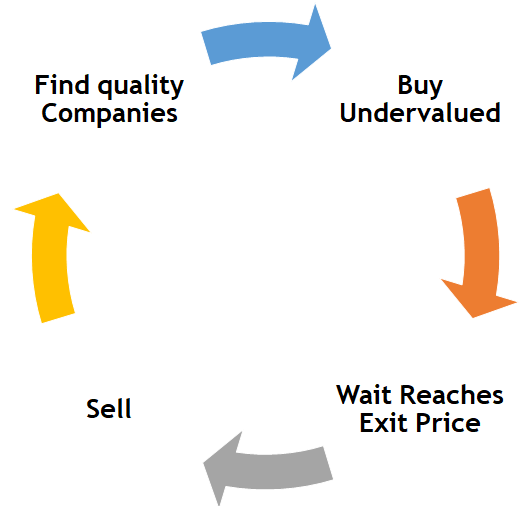Have you ever had trouble sleeping at night because you were worried about how your stocks are going to perform the next day?
Well, I used to have that trouble too.
In the past, I used to open my brokerage app every few hours or so - just to see how my stocks were performing. And if my stocks were falling, I will start panicking and thinking whether I should sell the stocks, or if it was rallying - then I would get overly excited.
That used to be me - constantly riding the emotional roller coaster.
Until I had these three simple mental shifts on how I view the stock market and everything changed.
I sleep soundly at night, and instead of panicking when there is a stock market correction - I was all ready to fire my bullets at the opportunities that were available.
And in this blog post, I am going to share with you exactly what these three mental shifts are.
Behind Every Stock, Is An Actual Business

This is the fundamentals of stock market investing.
Remember that when you invest in a stock, you are investing in an actual business.
An actual business that is serving their customers.
Most people make the mistake of looking at stocks in term of share prices, rather as an underlying business.
Basing your decisions purely based on share prices is almost akin to trading and not investing.
And there is a very simple test will tell us whether someone is an investor or not.
If someone were to give you a stock tip - which will you do first:
- Go and look at the financial numbers of the company
- Look at the share price and the stock chart
If you are an investor - you will definitely want to check out the fundamentals of the company first before even looking at the share price.
Now let's switch things up a little to make sure that you understand the concept.
Example: Imagine if you went to a shop, wanting to buy eggs to cook a delicious scramble eggs for your family, and there were two boxes of eggs - Box A and Box B.
However, one of the boxes has fresh eggs, while the other has rotten eggs.
So you went to ask the shop owner. Which question will you ask first?
a. Which is the box with fresh eggs?
b. How much is Box A and how much is Box B.
Ans: Well, you probably ask which is the box with fresh eggs right? Unless you want to cook scramble eggs with rotten eggs...
Here's the real lesson - always focus on the fundamentals first.
Because if the eggs are rotten, will you even bother asking how much the eggs are?
Unfortunately, many of us who were just starting out would make the mistake of investing in a stock simply because the share price of a stock has fallen.
And the mindset is,
"Wow the stock is now at $7? If it recovers back to its original price of $14 - I can make a huge return!"
Little did we expect - that $7 was paid for a rotten egg (i.e. a company with poor fundamentals)
When we buy stocks - we want to focus on the fundamentals.
If a stock does not even have good fundamentals - you shouldn't even consider buying the stock in the first place.
But here's the thing - how do I know if the stock has good fundamentals?
Well - this is where the 8-Point Checklist comes in.

Get Your 8-Point Checklist!
So that you know what stocks
to avoid investing in.
This checklist reveals to you the 8 financial numbers that you have to look out for before investing in any company.
If the company passes this checklist - only then I will consider investing in the company.
Putting Your Money In A Quality Company Will Always Beat Bank Returns

When people first invest in the stock market - they will start small, maybe with a few hundred dollars.
Now, there's nothing wrong with starting small, but acknowledge that if you truly want to design your life for financial freedom, you eventually need to put more money into the stock market.
In fact, to quote Robert G Allen:
"How many millionaires do you know who have become wealthy by investing in savings accounts? I rest my case."
This was the second mental shift for me - If I have too much money lying in the bank working at a measly 0.05% return - something is wrong.
When we invest in a quality company that passes the 8-Point checklist, the returns will always be better than leaving money in the bank.
However, there is one caveat - you have the hold the company for the long term.
The biggest reason why most people will lose money in the stock market is because they don't have the emotional stability to hold through their quality companies.
You see, the stock market in the short term is a voting machine - but in the long term, it is a weighing machine.
And a quality company that is growing its earnings will always have its share price increase in the long run.
After all, share price is driven by earnings.
This is why I am able to invest most of my net worth in my brokerage account without worrying about stock market corrections - because of the ability to think long term.
And to leave you another quote by John Bogle:
If you have trouble imagining a 20% loss in the stock market, you shouldn’t be in stocks."
This loss refers to a paper loss - which is unrealized loss in the stock market.
You see, during stock market corrections - it is not uncommon to see your portfolio have a dip.
However, these will be the best times to invest and collect even more stocks at reasonable valuations.
And if you are having trouble buying stocks when the stock market falls - remember that putting your money in quality companies will always have better returns than leaving your money in the bank.
And this was the second mental shift for me.
Stop Exchanging Time For Money

This is the third mental shift.
(I apologies to my newsletter subscribers - but I will repeat this over and over again)
The stock market is supposed to be a place where you exchange money for money and not time for money.
If you have already invested in a quality company - there are only two things that you need to do:
- Do a quality check on the stock every quarter - making sure the fundamentals of the company are still intact
- Wait
That's right - wait.
All we had to do was to wait for the stock to reach our exit price before selling the stock.
To quote Warren Buffet:
Much success can be attributed to inactivity. Most investors cannot resist the temptation to constantly buy and sell.
You don't have to constantly read news from CNBC and playing this guessing game, trying to time the next stock market correction.
After all, time in the market is much more important than timing the market.
Investing in the stock market is a simple activity that comes in these four steps.

We don't have to try to overcomplicate the process, and keeping our eyes glued to the stock market all the time.
Remember, when it comes to investing in the stock market - don't spend too much time on it. Once you already have a game plan - just execute the plan, and let the stock market do its thing.
In fact, you will be much better off using the extra time to invest in your own knowledge and skill sets - rather than monitoring share price movements.
What To Do Next?

These were the three major mental shifts that helped me invest in the stock market without the emotional roller coaster.
And if you are just starting out in investing, here's a resource page that I have designed for investors who are just starting out.

The Stock Investing Hub
Never get lost in your investments again.
Lastly, leave a comment below and share what you've learned, how you feel and your biggest takeaway.
